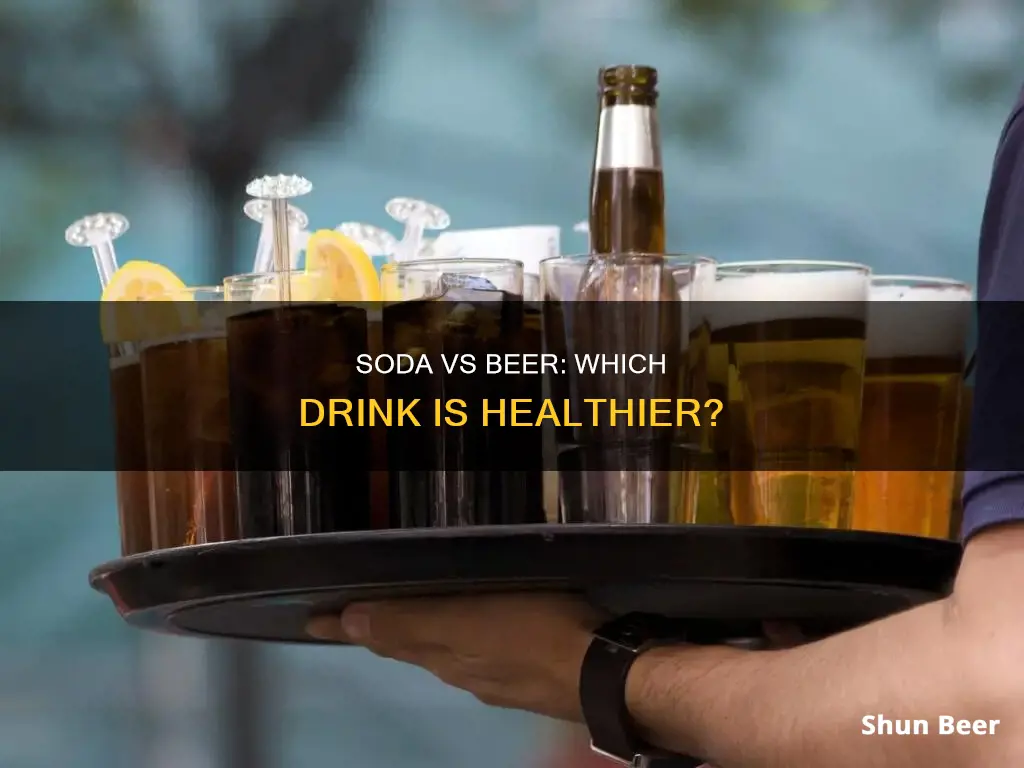
Soda and beer are both unhealthy drinks that should be consumed in moderation. However, when comparing the two, beer is considered to be the healthier option. A standard can of soda contains around 39 grams of sugar, which is significantly higher than the recommended daily intake. Beer, on the other hand, contains very little sugar, with an average 12-ounce serving containing only 1 to 2 grams. While beer does contain alcohol, which can have negative health effects, it also has some nutritional value, providing vitamins such as thiamin, riboflavin, and vitamin B-12. Additionally, beer has a lower glycemic load than soda, which can help with weight loss, blood sugar control, and reducing the risk of circulation disease and diabetes.
What You'll Learn

Soda and beer have high calorie counts but offer little nutritional value
While beer and soda are both unhealthy, they are not equally bad for you. Both drinks have high calorie counts and offer little nutritional value. However, beer has fewer calories and less sugar than soda, so it is considered the healthier option when comparing the two.
A 12-ounce can of standard soda contains about 39 grams of sugar, which is equal to about 9 teaspoons. This amount of sugar easily puts someone over the daily recommended threshold, which is 25 grams for women and 36 grams for men, according to the American Heart Association (AHA). Regularly consuming high levels of added sugar increases the risk of health issues such as higher blood pressure, inflammation, weight gain, diabetes, and fatty liver disease.
On the other hand, beer contains very little sugar. A standard 12-ounce serving of regular beer has around 1 to 2 grams of sugar. Even light beers, which have lower alcohol content, usually have slightly less. So, while beer does contain some sugar, it is not nearly as high as that of a sugary soda.
When it comes to calories, both drinks are relatively high. A can of soda can have anywhere from 140 to 170 calories or more. Beer is similar, with a standard 12-ounce can containing approximately 100 to 150 calories, depending on the type. Light beers typically have around 90 to 100 calories, while craft beers can have 150 to 250 calories or more. Therefore, neither drink is a good choice if you are concerned about calorie intake.
In addition to their high calorie counts, soda and beer offer little to no nutritional value. While beer does contain some nutrients, such as trace amounts of minerals like potassium, magnesium, phosphorus, and selenium, the levels are incredibly low and not significant when compared to other foods or beverages. As a result, both beer and soda are considered sources of empty calories, providing energy without any real nutritional benefits.
While beer may have a slight edge over soda in terms of sugar and calorie content, it is important to note that it contains alcohol, which has its own health implications. Excessive alcohol consumption can lead to addiction, liver disease, and other health problems. Therefore, it is crucial to consume beer in moderation and be mindful of its effects on your overall health.
Seltzers vs Beer: Which is the Healthier Choice?
You may want to see also

Beer has less sugar than soda
While beer and soda are both considered unhealthy, beer has less sugar than soda. A 12-ounce can of standard soda contains about 39 grams of sugar, which is equal to about 9 teaspoons of sugar per can. On the other hand, a standard 12-ounce serving of regular beer contains only 1 to 2 grams of sugar. The sugar in beer comes from the natural sugars found in the grains used during the brewing process, and much of this is consumed by yeast during fermentation.
The high levels of added sugar in soda increase the risk of health issues such as higher blood pressure, inflammation, weight gain, diabetes, and fatty liver disease. Beer, on the other hand, has a much lower sugar content and is therefore considered the healthier option when comparing the two beverages.
However, it is important to note that both beer and soda are high in calories and provide little to no nutritional value. Therefore, it is recommended to consume these beverages in moderation and opt for healthier alternatives such as water or unsweetened herbal tea.
Beer-Battered Fish: Healthy or Harmful?
You may want to see also

Beer has a lower glycemic load than soda
When it comes to health, neither soda nor beer can be considered "good" for you. However, when comparing the two, beer has a lower glycemic load than soda.
The glycemic load (GL) of a food is calculated by multiplying the glycemic index (GI) of the food by the amount of carbohydrate in grams provided by a serving of that food, and then dividing that total by 100. The GL of a food is considered high if it is ≥20, intermediate if it is between 11 and 19, and low if it is ≤10.
A 12-ounce can of standard soda contains about 39 grams of sugar, which is equal to about 9 teaspoons. This amount of sugar alone puts you over the recommended daily intake of sugar, which is 25 grams for women and 36 grams for men, as recommended by the American Heart Association (AHA). The high levels of added sugar in soda increase your risk of higher blood pressure, inflammation, weight gain, diabetes, and fatty liver disease.
On the other hand, beer contains a small amount of residual sugar from the fermentation process, but it is not nearly as high as the amount in soda. Most of the sugar in beer comes from the natural sugars found in the grains used during the brewing process. During fermentation, yeast consumes much of the sugar to produce alcohol, resulting in a relatively low final sugar content. On average, a standard 12-ounce serving of regular beer contains around 1 to 2 grams of sugar.
While the GI of beer is debated and difficult to determine due to the challenges of testing, it is generally considered a high-GI food. However, the GL of beer is lower than that of soda due to the significantly lower amount of sugar and carbohydrates. Therefore, when it comes to glycemic load, beer is the better option between the two beverages.
It is important to note that both soda and beer should be consumed in moderation, as excessive consumption can lead to negative health consequences.
Dark Beer: Healthier Choice or Just a Myth?
You may want to see also

Beer contains alcohol, which has health implications
Beer contains alcohol, which has implications for your health. While moderate alcohol consumption may have some potential health benefits, it's important to weigh these against the risks.
Drinking too much alcohol can interfere with the brain's communication pathways, affecting mood, behaviour, clear thinking, and coordination. It can also cause persistent changes in mood, including anxiety and irritability, impact sleep, weaken the immune system, change libido and sexual function, and affect appetite and weight.
Alcohol use can also lead to serious health problems, including liver disease, pancreatitis, and certain types of cancer. Drinking during pregnancy can lead to miscarriage, stillbirth, or premature delivery, and children exposed to alcohol in the womb may experience learning difficulties, long-term health issues, increased emotional problems, and developmental concerns.
Additionally, alcohol can affect the central nervous system, causing slowed speech, loss of coordination, and impaired decision-making. Chronic heavy drinking can lead to permanent brain damage, including Wernicke-Korsakoff syndrome, a brain disorder that affects memory.
The effects of alcohol on the digestive system can include abdominal fullness, diarrhoea, painful stools, and ulcers or hemorrhoids. Alcohol can also damage the tissues in the digestive tract, leading to malnutrition over time.
Alcohol's impact on the circulatory system can include difficulty pumping blood through the body and absorbing vitamins and minerals, which can result in fatigue and anemia.
When it comes to sexual and reproductive health, excessive drinking can prevent sex hormone production, affect erectile function, and make it difficult to achieve orgasm. It may also affect the menstrual cycle and increase the risk of infertility.
While beer may have slightly less sugar and fewer calories than soda, the presence of alcohol and its associated health risks tip the scales in favour of soda in this category. However, it's important to note that neither beverage can be considered truly healthy, and consumption of both should be done in moderation.
Ranch Water vs Beer: Which Drink is Healthier?
You may want to see also

Soda is linked to weight gain and obesity
Soda is often associated with weight gain and obesity due to its high sugar content. A typical can of soda contains about 39 grams of sugar, which is equivalent to about 9 teaspoons. This amount of sugar far exceeds the recommended daily intake of no more than 25 grams for women and 36 grams for men suggested by the American Heart Association (AHA). As a result, consuming just one can of soda can easily put an individual above the recommended daily limit.
The high sugar content in soda has been linked to an increased risk of weight gain and obesity. When individuals consume sugary beverages, they tend to take in more calories later in the day compared to when they consume solid food. This is because fluids don't provide the same feeling of fullness or satisfaction as solid foods, and the body doesn't register liquid calories in the same way. This can lead to individuals continuing to eat even after consuming a high-calorie drink.
Additionally, the sweet taste of soda, whether sweetened with sugar or artificial sweeteners, may stimulate the appetite for other sweet and high-carbohydrate foods, further contributing to weight gain. The carbonation in soda can also create a bloating sensation, making it easier to consume more food.
The link between soda consumption and weight gain has been supported by numerous studies. One study found that for each additional 12-ounce soda consumed by children each day, the odds of becoming obese increased by 60% during a 1½-year follow-up period. Another 20-year study on 120,000 men and women found that those who increased their sugary drink consumption by one 12-ounce serving per day gained more weight over time.
The high sugar content in soda has also been associated with an increased risk of type 2 diabetes, heart disease, and other chronic diseases. Regularly consuming high levels of added sugar increases the risk of health issues such as higher blood pressure, inflammation, diabetes, and fatty liver disease. These health issues are linked to an increased risk of heart attack and stroke.
In conclusion, soda is linked to weight gain and obesity due to its high sugar content, which contributes to excess calorie intake and increased appetite. The consumption of soda has been consistently associated with increased energy intake and weight gain in both children and adults. Additionally, the health risks associated with high sugar consumption further emphasize the link between soda and negative health outcomes.
Hard Cider vs Beer: Which Is Healthier?
You may want to see also
Frequently asked questions
Both drinks are mostly water, but beer contains some nutrients and chemicals that may be beneficial to your health. Beer also has no fat, no sugar, and fewer calories and carbs than soda. However, soda is typically sweetened with high fructose corn syrup, which has been linked to negative health effects. Therefore, most medical experts agree that soda is decidedly unhealthier than beer.
The obesity epidemic in the US and Mexico has been popularly attributed to fatty foods, but there is also good reason to believe that sweet beverages are a more likely culprit. This is because it is much easier to ingest huge quantities of calories by drinking than by eating. Beer is often considered to cause "beer bellies", but drinking in moderation will not lead to substantial weight gain. Soda, on the other hand, contains added sugars that directly lead to drastic weight gain and eventually, obesity.
Beer provides thiamin, riboflavin, niacin, vitamin B-6, follate, and vitamin B-12. Drinking alcohol in moderation has also been linked to better health and a longer life than abstaining. Additionally, beer has a lower glycemic load than soda, which can help with weight loss, maintaining good blood sugar levels, lowering the risk of circulation disease, and reducing the risk of diabetes.







